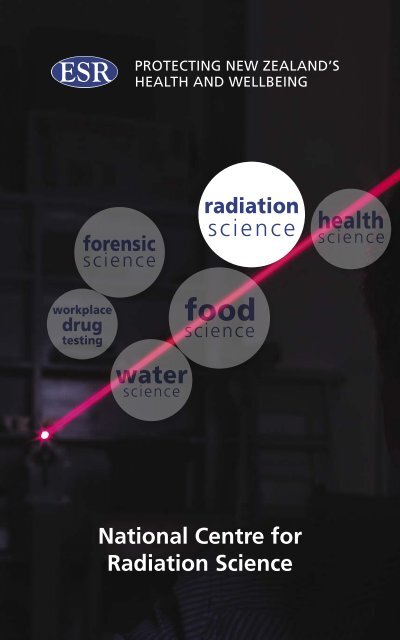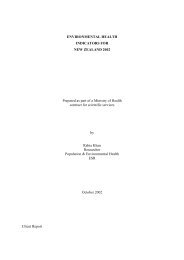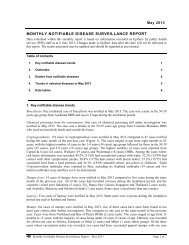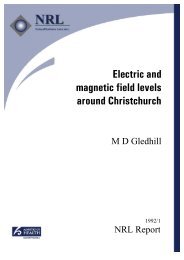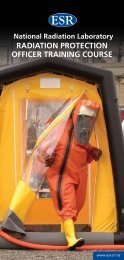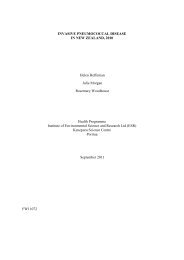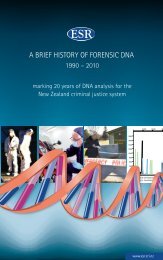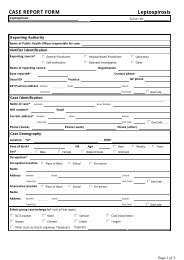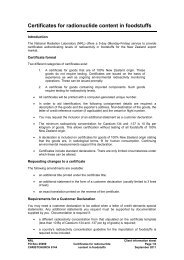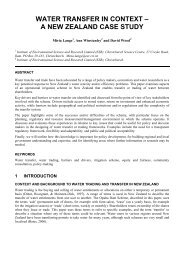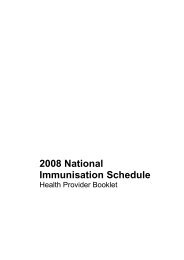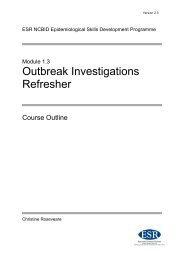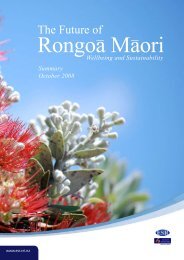NCRS capability statement - Environmental Science & Research
NCRS capability statement - Environmental Science & Research
NCRS capability statement - Environmental Science & Research
You also want an ePaper? Increase the reach of your titles
YUMPU automatically turns print PDFs into web optimized ePapers that Google loves.
Protecting New Zealand’shealth and wellbeingforensicscienceworkplacedrugtestingradiationsciencefoodsciencehealthsciencewaterscienceNational Centre forRadiation <strong>Science</strong>
The Institute of <strong>Environmental</strong> <strong>Science</strong> and <strong>Research</strong> (ESR) protects andenhances New Zealand’s health and wellbeing by addressing challenges thatrequire science-based innovations in health, radiation protection, justice andsecurity, food safety, food integrity, environmental health, occupational safetyand environmental hazards.ESR provides independent scientific advice and services to clients so they can deliverevidence-based policy and services. We have internationally recognised capabilities inradiation science, infectious diseases, forensic science and science-based services and arevalued as advisors on reference science in health, radiation protection and forensics.We have a unique role in protecting and defending New Zealand.More information about other ESR services – health, forensic, environmentalhealth, radiation protection and food safety – is available on our websitewww.esr.cri.nz.Working with usWe take a project-based approach, bringing together the best teams to tackle tasks,whether that involves research, stakeholder engagement, service delivery or evidence forpolicy. We both lead and participate in teams drawn from across ESR, often involvingexternal collaborators and stakeholder organisations in New Zealand and overseas.ESR is a Crown research institute (CRI). It was incorporated in July 1992 and is whollyowned by the New Zealand Government. The two shareholding ministers appoint aboard of directors to govern the organisation. ESR has scientific facilities in Auckland,Wellington (Porirua and Wallaceville) and Christchurch. www.esr.cri.nz
National Centre for Radiation<strong>Science</strong>The National Centre for Radiation <strong>Science</strong> (previously the National RadiationLaboratory) is a specialist unit of the Institute of <strong>Environmental</strong> <strong>Science</strong> &<strong>Research</strong> Ltd (ESR) and is primarily based in Christchurch, New Zealand, withadditional staff located in Wellington and Auckland.On 1 December 2011, the National Radiation Laboratory was transferred from theMinistry of Health to ESR, with the exception of its regulatory function which stillcontinues to be provided by the Ministry of Health through the Office of Radiation Safety.On the 1 of July 2013, the National Radiation Laboratory was renamed the NationalCentre for Radiation <strong>Science</strong> (<strong>NCRS</strong>) to do justice to its new ESR focus: protecting peopleand their environment through science.The <strong>NCRS</strong> provides measurement and monitoring services, research <strong>capability</strong> and expertadvice on ionising and non-ionising radiation.Our goal is to ensure radiation science benefits New Zealand’s people, environment andindustries by helping protect them from radiation and radioactive contamination, as wellas promoting safe and beneficial use of radiation and radioactive materials.
Commercial ServicesCorporate Radiation ProtectionAdvisor (RPA)The <strong>NCRS</strong> provides a Corporate Radiation Protection Advisor service (RPA) which isindividually tailored to meet the needs of any organisation, facility or individual user ofradiation. A RPA partnership is intended to be comprehensive and flexible – providingonly the services and support needed – and adapting to changing client needs.Entering into a RPA partnership with <strong>NCRS</strong> is cost effective and provides reassuranceand confidence through the support of the National Centre for Radiation <strong>Science</strong>. A RPApartnership can provide all of your required radiation protection advice, support andancillary services (such as calibrations) through a single contract. A senior medical or healthphysicist will be appointed as your portfolio manager and principal point of contact.
Radiation Safety Training InstituteTraining courses are provided through ESR’s Radiation Training Institute. These includea range of radiation safety courses, emergency response training and customisedtraining programmes. The training assists participants to meet the licensing requirementswith the relevant regulatory authority. The courses also offer opportunities to gain abroad understanding and improve and develop knowledge of radiological protectionprinciples and practices. All of the courses offer a strong practical component.Customised training courses are provided to meet client needs. This is often as part ofa RPA partnership. All courses are delivered by practising experts in radiation protection.Examples of training courses:• Medical radiation protection supervisors• Radiation protection officers• Radiation incident and emergency response for first responders• Radiation safety for various industrial and non-medical users (e.g. industrialradiography, industrial gauging, x-ray inspection equipment, use of radioactivematerials in laboratories)• Transport of radioactive material• Specialised short courses (e.g. nuclear power for the decision makers and thenon-specialist)• Laser safety
Non-ionising Radiation Testing andAdviceESR offers a number of measurement services across the electromagnetic spectrum.Our non-ionising testing and advice service primarily aims to verify whether exposuresto electromagnetic fields comply with health and safety guidelines. Survey results aredocumented in reports, which can be tailored to meet client needs with regards to therequired level of detail and supplementary information.Examples include:• Radiofrequency fields around cell phone sites• Extremely low frequency fields around power lines and other electrical installations(e.g. sub-stations)• Static magnetic fields around MRI scanners• Advice on laser protection
CalibrationESR’s radiation calibration facilities have a long-standing historyin New Zealand—dating back to the 1930s. Today, the focusof the calibration laboratory remains unchanged: enablingprofessionals to work with radiation in a safe manner.In medicine, Cobalt-60 and kilovolt (kV) x-ray exposurefacilities are used in conjunction with physical standards ofabsorbed dose to water and exposure to calibrate instrumentsused to ensure that radiotherapy doses delivered in NewZealand hospitals are accurate, and equivalent to theiroverseas counterparts. Similarly, the kV x-ray exposure facilityis used to calibrate instruments used to ensure the correct andoptimal set-up of diagnostic x-ray equipment (such as CT scanners). This is extremelyimportant for patients undergoing diagnostic examinations, where there is an obviousneed to obtain the required information to enable a diagnosis, but it must be at minimalrisk to the individual concerned.In industry and research, Caesium-137 exposure facilities and standard contaminatedsurfaces are available to calibrate survey instruments that can be used to ensure a safeworking environment for those who could be accidentally or unnecessarily exposed toradiation through their day-to-day use of x-ray equipment or radioactive sources.The services of the calibration laboratory are delivered by staff who collectively havedecades of experience in the science of radiation measurement. For anybody seekingadvice, support, or services related to radiation measurement, this is the place to start.Our main services include:• Cobalt-60 based absorbed dose to water calibrations suitable for use in radiotherapy• Cobalt-60 based air kerma calibrations• X-ray calibration of therapy dosemeters (from 10 kV to 300 kV)• Calibration of diagnostic dosemeters suitable for a range of measurementapplications• Calibration of non-invasive kVp meters for general radiographic, fluoroscopic,and mammographic measurement applications• Calibration of protection level radiation survey instrumentation• Calibration of surface contamination meters• Irradiations of small samples
<strong>Environmental</strong> & Food TestingESR maintains a specialised environmental radiochemistry laboratory dedicated to lowlevelradioactivity measurements and capable of providing a wide range of analyticalservices to clients. The laboratory has achieved accreditation to ISO 17025 for most ofour testing methods. Analytical services include the measurement of gamma rays andalpha and beta particles from radionuclides present in:• foodstuffs and drinking waters• consumer and manufactured goods• soil, sediment and non-biological solids• biological solids• waste and ground water samples• petrochemical and fertiliser industry samples (NORM and TENORM)• atmospheric particulates.Our radioactivity measurement techniques include gamma and alpha spectrometry, aswell as low-background liquid scintillation counting. If required by a specific sampletype, we perform chemical digestion and separation techniques prior to radioactivitycounting.Other services include:• Certification of radioactivity levels in foodstuffs• Provision of advice on matters concerning radioactivity in the environment• <strong>Environmental</strong> radioactivity monitoring and radiation surveys• Wipe testing for radioactive contamination detection and quantification
Personal Dosimetry ServiceThe effects of radiation exposure on the human body are cumulative. Monitoringindividual exposure to workplace radiation can help demonstrate that recommendedand legislated dose limits are not exceeded, and that doses received are as low asreasonably achievable. ESR’s Personal Dosimetry Service (PDS) offers employers a way tomeasure and record the ionising radiation doses employees are exposed to at work.ESR’s Personal Dosimetry Service offers employers aconvenient means to measure and record the radiationdoses employees accumulate at work.ESR supports its monitoring service with analysis and reporting, based on specialisttechnical knowledge and experience. ESR’s Personal Dosimetry Service is a unique NewZealand <strong>capability</strong> as ESR is the only PDS supplier who processes all steps of the servicesupply chain within the country. ESR’s local and accessible expertise in dosimetry allowsus to evaluate the information on your reports and provide instant feedback if necessary.Monitoring can be undertaken continuously (monthly or quarterly) or as a “one-off”option. ESR’s measurement methods and quality system service are accredited to ISO17025: General requirements for the competence of testing and calibration laboratoriesby International Accreditation New Zealand. ESR provides monitoring servicesthroughout New Zealand and Australia.
Advice and Support toGovernmentThe <strong>NCRS</strong> provides advice and support to the New Zealand Government, includingthe Ministry of Health (MoH), the Ministry of Foreign Affairs and Trade (MFAT) and theMinistry for Primary Industries (MPI).ADVICE INCLUDES:• Principal radiological science advisor to MoH and provider of regulatory supportactivities including on-site inspections• Radiological emergency and incident response• National radioactive waste management• Non-ionising radiation• Advice to the public• National dose surveys and surveillance• Regional cooperative projects of the International Atomic Energy Agency (IAEA)• Operation of stations and a certified laboratory in the International MonitoringSystem (IMS) established by the Comprehensive Nuclear Test Ban Treaty (CTBT)• Advice and support to MFAT in the implementation of the CTBT verificationsystem and the meaning of signals detected by the IMS
<strong>Research</strong>The <strong>NCRS</strong> research programme is supported by qualified staff with up-to-dateknowledge of all aspects of radiation. ESR has a range of capabilities that facilitateresearch, including radioactivity and radiation measurement facilities, a specialisedradiochemistry laboratory, a gamma-irradiation facility, a calibration laboratory anddiverse international linkages.<strong>Research</strong> undertaken by <strong>NCRS</strong> is concerned primarily with:• risk reduction through which we aim to protect the public, medical patients,occupational users, the environment and primary industries from the adverse effectsof radiation and radioactive contamination• the use of irradiation for technological innovation and protection of New Zealand’senvironment and industries.
For further information, please contact:ESRNational Centre for Radiation <strong>Science</strong>27 Creyke Road, Ilam, Christchurch 8041Tel: +64 3 351 6019 Email: ncrs@esr.cri.nzwww.esr.cri.nz/<strong>NCRS</strong>The National Centre for Radiation <strong>Science</strong> (<strong>NCRS</strong>) is a specialistunit of the Institute of <strong>Environmental</strong> <strong>Science</strong> and <strong>Research</strong> Ltd (ESR).ESR is a New Zealand Crown <strong>Research</strong> Institute whose missionis to protect people and their environment through science.The <strong>NCRS</strong> provides measurement and monitoring services, research<strong>capability</strong> and expert advice on ionising and non-ionising radiation.Our goal is to ensure radiation science benefits New Zealand’s people,environment and industries, by helping protect them from radiationand radioactive contamination; as well as promoting safeand beneficial use of radiation and radioactive materials.August 2013


